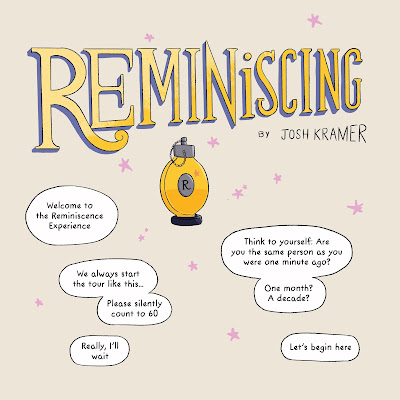I came across a new comic by Josh Kramer recently. It's a self-contained webcomic called Reminiscing which is about several people and their experiences with a drug that allows them to relive a memory from days, weeks, or even years in the past. The first thing that piqued my interest about it, though, was that Kramer described it as "a choose-your-own-way, interactive comic built on the whiteboarding platform Miro." Let's set aside what it actually says for a moment, and look at it what it doesn't say. In his newsletter (where I learned about this) he never once relays anything about the plot or characters or anything to do with the story itself. (He does make a reference at the very end to what the reader's own "question experience" might be, but that phrase doesn't make any sense until after you've read the comic.) Instead Kramer focuses on the experience of reading the comic; that it's interactive and that it's built on the Miro platform, which has become quite familiar to office workers working remotely over the past two years.
The narrative itself is more about the character- and world-building than a complex plot. We follow four people undergoing this Reminisce Experience. At first they're all together as they go through the orientation -- which expertly also serves as orientation for the reader who might be unfamiliar with Miro -- before we eventually get to follow each of their individual journeys, which can be read in any order. Kramer's able to do that by using the 'infinite canvas' where the comic can branch off in any direction effectively indefinitely. He's also able to utilize that to drop in a few Easter Eggs that readers might stumble across.
Obviously, the notion of infinite canvas comics isn't new. It was more prevalent in the early days of webcomics when creators were still trying to figure out how webcomics even worked, but it isn't seen as much any more because A) it's more difficult to monetize using 'standard' webcomic options and B) it requires some measure of talent with designing and building websites in addition to normal comics-making skills. While the first is still an issue -- particularly here with it's choose-your-own-way narrative -- this is the first I've seen a platform like Miro used for making comics. It's effectively acting as a build platform with a drag-and-drop interface to allow anyone with the barest of internet savvy to create something. I applaud Kramer for the creative realization that Miro could be used in such a way.
There are some drawbacks to this approach, however. First, it has to be hosted on Miro's own site, so a creator will have to direct traffic to servers they have no real access or control of, the same as if you had a webcomic that was hosted exclusively on Facebook. Second, while you can prevent readers from making any edits/changes to the board, Miro still has a default view that includes their toolbar and such. Everything is greyed out, but it's still there. You can switch to a "presentation mode" that hides most of that, but they always have at least some options visible. Which makes sense from Miro's perspective and, while you can certainly craft a comic knowing those elements are present so you don't accidentally hide critical information, it's still an intrusion the creator has no control over.
That's not to say Miro is necessarily a bad platform, but just that it's certainly not designed with hosting webcomics in mind. And it's not the only option like it out there either. Things like Creately, MURAL, and InVision all do more-or-less the same thing, and I'm sure they all have their own pros and cons as well. But what I find striking here is that one of the major hurdles that creators face when working on infinite canvas comics is largely taken care of now. If you didn't care about monetizing your comic or are able to figure out a reliable way to monetize them (Embedded links to store items? Print copies done on poster size sheets?), that opens up some interesting storytelling possibilities for creators who might not, from a practical perspective, have been able to take advantage of that idea before. I'll be curious to see if/when/how other creators might pick up and run with this idea.
Another Webcomic Platform Option
By Sean Kleefeld | Thursday, February 24, 2022
Leave a Comment







0 comments:
Post a Comment